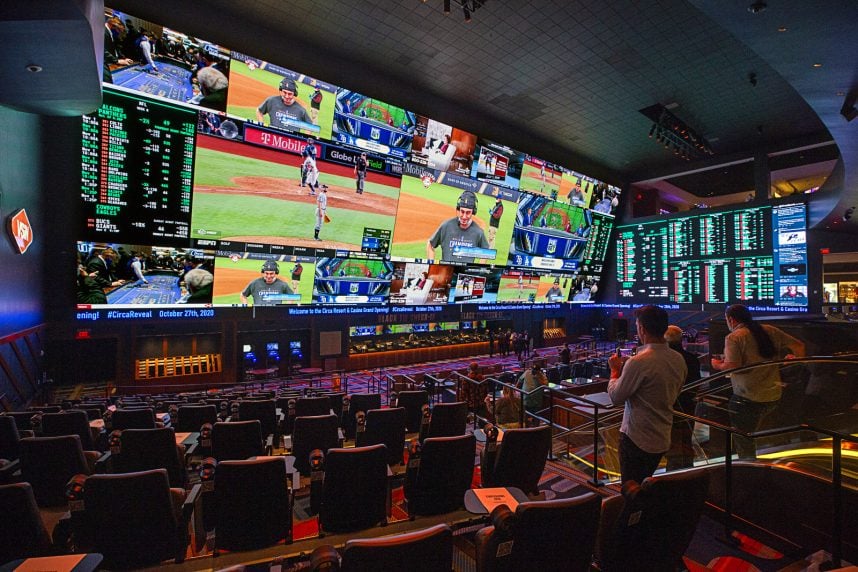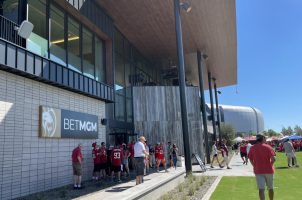Nevada In-Person Requirement Hampering Sports Betting Revenue
Posted on: July 2, 2024, 05:22h.
Last updated on: July 3, 2024, 09:49h.
When the Supreme Court handed down its ruling on the Professional and Amateur Sports Protection Act (PASPA) in 2018, it was widely known that Nevada would lose its monopoly on regulated sports wagering in the US.

What wasn’t known to industry observers at that time was the extent to which draconian regulations would relegate Nevada to being a regional player while hindering the state’s ability to generate more tax revenue from the sports betting boom. But that’s exactly what’s happening. Nevada’s sports betting industry is being hindered by the state’s in-person registration requirement.
That means residents must physically enter a casino to fill out paperwork to open a mobile sports betting account, and that process must be repeated for each account they want. In a hypothetical scenario, a bettor wanting access to BetMGM, Caesars Sportsbook, and Circa Sports would need to go to three casinos to sign up for those apps.
On its face, this seems like a minor annoyance for potential consumers, but that minor annoyance actually has a tangible impact on the local market,” wrote Michael Schaus, founder of Schaus Creative LLC, in an op-ed for The Nevada Independent.
He’s right. April was the first time since online sports betting went live in Arizona that sportsbook operators in that state booked more bets than their counterparts in Nevada, and the gap was wide at $87 million. Last year, Nevada sportsbooks booked about $1.7 billion more in bets than equivalent operations in Arizona, but Arizona books took in nearly $77 million more in revenue, highlighting the advantages of mobile registration.
Nevada Regs Create Disadvantages
Nevada’s in-person registration requirement for mobile sports betting accounts has been decried by the industry and it has noticeable drawbacks.
For example, Las Vegas locals are often loathe to go to the Strip, but that’s exactly where they have to go to sign up for BetMGM, Caesars Sportsbook, or SuperBook accounts, among others. For locals who don’t want to go to the Strip or downtown, their sports wagering app options are essentially confined to offerings from Boyd Gaming and Red Rock Resorts.
Until Nevada scraps the in-person registration requirement, it’s likely the gap between it and Arizona will grow, with the latter potentially reaching annual revenue advantages of $100 million to $200 million over the Silver State, according to some experts. That’s to say, Arizona is operating in the 21st century and Nevada regulations are costing the state money.
“And while that might be frustrating for consumers, and a bit puzzling for tourists, it also means Nevada operators and state coffers are missing out on their share of the online gaming gold rush taking place in markets all around us,” added Schaus.
Nevada In-Person Regs Keeping Big Players Out
Nevada’s in-person registration requirement has also kept the two largest online sportsbook operators, FanDuel and DraftKings, out of the state. Speculation as to when that could change is long-running, and those companies have options, including potentially buying land-based casinos.
Still, some professional sports bettors in the Las Vegas area will make the trek to the Arizona border to access DraftKings and FanDuel because those apps offer larger betting menus than Sin City-based sportsbooks, indicating that Southern Nevada sportsbooks don’t have geographic moats.
Nevada retains some geographic advantages because the other states that border it — California, Idaho, and Utah — don’t allow sports betting, while Oregon is home to a DraftKings monopoly and is close to just a small percentage of Nevada’s total population.
Related News Articles
FanDuel Acquisition Could Be Needed for Nevada Entry
Bet365, Fanatics Could Eye Arizona Entry
Arizona Again Opening Sports Betting Market to New Operators
MGM Must Disclose Ransomware Demand if it Pays One
Most Popular
FTC: Casino Resort Fees Must Be Included in Upfront Hotel Rates
Genovese Capo Sentenced for Illegal Gambling on Long Island
NBA Referees Expose Sports Betting Abuse Following Steve Kerr Meltdown
UPDATE: Former Resorts World & MGM Grand Prez Loses Gaming License
Most Commented
-
UPDATE: Whiskey Pete’s Casino Near Las Vegas Closes
— December 20, 2024 — 30 Comments -
Caesars Virginia in Danville Now Accepting Hotel Room Reservations
— November 27, 2024 — 9 Comments -
UPDATE: Former Resorts World & MGM Grand Prez Loses Gaming License
— December 19, 2024 — 8 Comments -
FTC: Casino Resort Fees Must Be Included in Upfront Hotel Rates
— December 17, 2024 — 7 Comments
















No comments yet